- Home
- James Phelan
Quarantine Page 8
Quarantine Read online
Page 8
“It . . . killed them all?”
I shook my head. After a moment she got it.
“The virus?”
“Caleb was closest. I ran. I had to. He—”
“He’s one of them.”
I nodded.
“He’s—he’s one of the chasing kind, isn’t he?”
“Yeah.”
She looked like she was going to throw up.
“And it might happen again, at any moment—there could be an unexploded missile or some of the contagion close by—”
“Stop it.”
“I’m just saying—”
She spoke to the floor: “You know those guys who tried to leave were attacked.”
Damn. I’d hoped she wouldn’t have been told that, but I guess news traveled fast around here.
“My dad tried to stop them from leaving.”
“They knew what they were doing.”
She hesitated.
“My dad was out on the food party that day,” she said.
I didn’t know what to say. Or what to think. What did she mean—did she suspect her dad of killing them? Why would he do that, to prove a point? To force the rest to stay? I let her reside in a moment of silence, willing her to continue, but she didn’t.
“If you knew anything about that, would you tell me?”
She nodded. She didn’t look at me, but she nodded. “You don’t need to convince me to leave,” she said, her arms wrapped around her legs, her knees tucked under her chin. “But what if Bob comes back and tells us something that makes people think it’s safer to stay here? It’ll be even harder then.”
“Your dad would feel justified.”
“Please, Jesse, can’t you speak to him?”
“That’s not my place.”
“Please, he might listen to you.”
“Why do you think he’d listen to me?”
“Because you intervened in the fight. Because you’ve been outside—seen people, talked to them.”
She looked at me and she held my gaze.
“Tell my dad about the group of soldiers you met,” she said. “Tell my dad about them before it gets worse around here. Last night, Jesse, what my dad did to Daniel? We’re turning on each other. First this attack, the infected, the weather, the other survivors—now we’re turning on ourselves . . . Please.”
“Okay,” I said. “Okay.”
Dinner was rowdy. Expectant. Feverish. Voices were raised and arguments were spreading like little wildfires, flaring here and there, then gone again, only to flare up once more and travel around the packed tables like a wave. This room had been something of an oasis last time I’d eaten here. Calm, communal, nurturing. How things had changed.
Many people wanted to leave—up to twenty-five now. Daniel sensed a consensus was so close that he had organized a few people to start packing supplies on some improvised wheeled carts. Whatever news Bob brought, they’d be leaving; either tomorrow or soon. They’d seen and heard enough.
The old juice lady passed and I heard her say: “Somewhere warmer. Somewhere safer. Somewhere better than here—anywhere better than here.”
That was the crux of their argument, their soundbites, their best-of reel: Did they really grasp that this was life and death, the highest stakes there could be, with no room for error?
“I’m sick of this city!” a guy yelled. I recognized him: he’d been tending to their small stock of firearms when I first arrived. “Before all this I mean. There’s—everything is surface, don’tcha think? And look at it now—we’re living in a world where we’re entitled to go out there and get some. Let’s go shoot some people who are worse off than we are. Who gives a damn? They’re a lesser class of human beings, the new minority. If they get in my way . . .”
I didn’t have the heart to tell him that they weren’t the minority, we were. I hoped his disposition and opinion wasn’t contagious. You needed to be alert out there, open to surprise, not driven by rage and revenge.
“The hell with it all—and the hell with this place,” he continued. Well, at least he had spirit. “Let’s get outta here!”
We walked between the tables, and loaded up our plates with more of the delicious food on offer. After we’d eaten, we walked up to Tom at his table. I had a bad feeling about this.
“He won’t listen to me, he doesn’t like me—” I said to Paige.
“He doesn’t know you well, but he’ll listen, he listens to everyone,” she said. He knew me well enough to know that I fancied his daughter—wasn’t that reason enough not to talk to him? But Paige had already dragged me over until I was almost in arm’s reach.
Tom sat on the edge of a table talking to a group that consisted of nearly every adult at the piers. He stopped talking, looked at me.
“Tom, can I say something, to everyone?”
In public, with everyone watching, he was generous and open. Maybe he was keen to save face after the fight. “You don’t have to ask—”
“I met a group of guys a few days ago,” I said, scanning every face as I spoke. He seemed a little miffed that I didn’t wait for the full answer to my rhetorical question. “They were dressed like US soldiers. They were walking, armed with assault rifles, with a couple of heavy trucks. Two days later I saw them motoring north, with one of the unexploded missiles from this attack in the back of their truck.”
They listened, all of them. Thirty-something adult faces turned towards me.
“One of them had told me that if I were to leave, not to head south or west, not to head anyplace warmer—”
“Why?” Tom asked.
“Because this virus is worse there,” I said. “He said the warmer the climate, the worse the infected are.”
Tom shook his head, and there was murmuring among the group.
“That all?” Tom asked.
“He said to head north, where it’s colder.”
“Old news,” he said. “We heard that from someplace else, Jesse. This is where we need to wait it out.”
He went back to arguing, to putting forward his case to stay put. Tom wanted to stay, maybe to help those who kept turning up—there were at least three unfamiliar faces here and they’d obviously integrated well, as everyone seemed to, so quickly—maybe just to stay in a place he thought he knew. Here they had beds and warmth and food and security.
“I know you heard it before,” I said, but he didn’t hear me as he was talking loudly at the same time, “But what if you’re wrong? What if there’s no ‘waiting out,’ beyond waiting to die?”
“We’ve heard enough, thanks. We’ll make our own decisions.”
“I have to tell you something,” I said.
“You have to?”
“Your daughter asked me to.”
He looked past me to Paige.
“Please listen to him, Dad.”
“I don’t care if you listen to me or not,” I said to Tom. I stood right next to him, at the head of the table, so that I could be heard by everyone seated there. Daniel was at the far end, and his congregation looked on in particular interest.
“You all do what you have to do, decide your own destiny. But I want you to know what I know, because it may help you make your decision.”
Most people nodded in acknowledgment.
“I’ve been here since the attack, just like you,” I said. “I’ve lived through hell, just like you. But you know what else? I met these soldiers. And one of them did tell me to head north, if I could. That things would get worse here. And you know what? Things have got worse here.”
There was a murmuring of agreement.
“Thanks for that,” Tom said, dismissing me. “Now—”
“There’s one more thing—”
“That’s fine, thanks, kid—”
“Give him a moment,” Daniel said, and every face at the table turned to me—Tom could see that, as clearly as I could. “What else, Jesse?”
“These soldiers were transporting a missile out of Manhattan when it
was hit by a US drone aircraft,” I said, talking quickly. The murmuring stopped and the group watched me, waiting for more. “A US unmanned aircraft. Attacking their own men on the ground. The missile from the aircraft hit the truck and detonated the missile left over from the attack. It was a huge explosion.”
I looked down to the end and was surprised to see that the look on Daniel’s face was mirrored by pretty much everyone else at the table. They all wanted to hear every little detail.
“The explosion set off the virus.”
Some chairs moved at that, perhaps out of fear, to get away from me.
“I know you were told that there was a path clear to the north because my friend told you,” I said. “My friend, Caleb.”
I could tell there was recognition there, even on Tom’s face.
“Caleb was there with me that night. He was closest to the explosion.”
“No!” a lady yelled.
“He became . . . he’s infected. He’s infected and because he was so close to the contagion, he became one of the—he’s one of the deranged ones.”
The woman gasped again. Others murmured to their neighbors. A couple of people began to sob.
“He’s lost. He’s gone.” I stood by Tom and looked him square in the eyes. “Given the chance he’ll hunt you down and drink what’s in you. Hell, he’d kill me too, given the chance.”
The room was silent.
“That’s what’s here. That’s what I’ve seen. That’s a big part of why I want to leave.” I looked all around, every face attentive, an assembly of truth. “If there’s a way out of here, off this island and out of this city, I’m taking it. Whether it’s Bob’s water-tunnel plan or something I have to engineer myself, I’m outta here. That’s all I know. It might not be any better, it might kill me, but it’s what I have to do. Whatever is ahead of me, it’s the choice I make.”
I could hear the people around me breathing. But I felt as if I was holding my breath. I knew the words that were coming next, because I’d said them before to Paige—I’d said them to anyone who had listened to me. Didn’t seem to make them any more real. But I liked the fact that they seemed to mean something to these people who were hearing them for the first time. It gave me a kind of hope.
“You decide what you want. Follow your heart, your mind, your gut, whatever. Me, I just want to go home.”
15
“Come on,” Paige said. “Let’s sit someplace quiet.”
“After you.” I followed her out to an office, and she lit a candle on the table between us. We could still hear the hum of conversation outside but not the details.
“How’s your head?” she asked.
“Fine, thanks.”
“Hand?”
“It’s still there.”
She laughed.
“Thanks for helping me out with it.”
“That’s cool. Thanks for speaking out back there.”
Paige asked if I wanted a drink of vodka and orange but I stuck to my Coke. On her second glass I could see she changed a bit; she sat differently, looked at me weirdly, started to touch my leg under the table.
“If we’re going tomorrow,” I said, “I’ll have to leave first thing to get a head start, to go collect Rachel and Felicity.
“Yeah . . .”
She rested her chin on her hands and looked out to nothing, a middle distance somewhere in the dark hallway.
“What is it?” I asked, pushing my glass to the side.
“What you said, about me being with my dad and Audrey.”
Oh, right. That.
“You still think I should stick with them, no matter what?”
“It’s your decision to make.”
“But that’s what you think?”
I bit my lip and she looked at me and I shrugged.
“That’s what I think,” I admitted. “Besides, wouldn’t they make you stay?”
“They can’t make me,” she said, finishing her drink. “I can do—”
I put my finger to her lips, and she kind of melted into it.
“Think about it more in the morning,” I said. “Don’t stress about it now. Wait and hear what Bob says when he comes back. Wait and see what your dad ends up deciding to do.”
She said, looking at the floor, “If we split up, I want to go with you, wherever you go.”
I was touched by the trust she placed in me. At the same time, my conscience told me I had to turn her offer down. I couldn’t separate her from her parents. So was I now telling her to stay? The words came reluctantly.
“Look, I still think that if your parents aren’t going, you should probably stay with them, otherwise—”
“Jesse, I want to be where you are.”
I swallowed hard.
“Paige—”
“I’d follow you, regardless. Understand?” She looked at me closely.
“You’d regret it, being separated from them. And it’s safe in here, this place. I’m not worried for you here. Those infected people can’t get at you here.”
“The uninfected could.”
Of course they could, we both knew it. It was a dumb thing for me to say, selling the safety of this place.
But that wasn’t what was bugging me the most right now. Paige’s devotion was great—what wouldn’t I have given for one of the girls at school to say that kind of thing to me?—but it put an extra pressure on me that I hadn’t had before. Sure, I had told myself that everything I was doing wasn’t just for me, but for others too—the little communities I had managed to pull together—but was that really true? In the end, I always went off alone. From circumstances, but from choices, too.
If I took Paige with me, my goal would become even more crucial. But what if the end result wasn’t good enough for her—or for me? I could promise to take her “home” but I couldn’t guarantee what home would be like. All of a sudden, it seemed a weird and unfamiliar concept.
“Besides,” she said. “I’m sick of safe. We’re all sick of safe.”
I leaned away from her a bit so that I could use my right hand to turn her face to mine. She had tears in her eyes. “Paige, I don’t want you to—look, if you leave your parents, you’re leaving home, yeah? You’d be losing something that you may not be able to ever get back.”
I was silent, hoping the words would make sense to her.
“And?” she challenged me.
“I don’t want anything to happen to you,” I said. “That’s what I’m scared of. You go out there, with forty people even, you have to be prepared to do whatever it takes to survive.”
“I can look after myself.”
“Can you?” I didn’t want to dissuade her, but I had to make her look at the facts. “You come across even a small group of armed guys, they might kill you or worse.”
“Worse?”
“You know what I mean.”
“You’re being stupid.”
“Paige, whatever your parents decide, stick with them,” I said. “They’re the two people who’ll stay with you, no matter what. They will never leave you behind, you got that?”
I knew then from her eyes that she got it, but also she wasn’t sold. I hadn’t even convinced myself—I mean, how could I? But Paige seemed to have made up her mind and be content with it. It really was what she wanted, and maybe it was the bravest choice anyone could make in this new earth: she’d been brave enough to find a new home. The problem was where she’d found that: in me.
16
I couldn’t sleep that night, and nor could most of the others. I helped them pack and it was apparent that they had enough food and gear to survive easily for a couple of weeks on the road, if it came to that.
With dawn approaching, I worried about Bob. Would he be back? I hadn’t really considered before what we’d do if we had a day of... nothing. Of Bob failing to return.
I lay on my bed, next to Paige. We were silent but for the occasional whisper. We tried to sleep and maybe she eventually did. A couple of hours of sta
ring at the dark ceiling and I was convinced: This morning, Bob will make it back. He had street smarts, was under no illusion about the dangers out there. Unlike so many survivors, he could take care of himself. I wished the same for my two friends waiting back at the Central Park Zoo, but with every second of sleepless thinking, my worry for them grew.
It didn’t rate worrying about yet. Deal with it when it comes. Whatever Bob’s news, I’d head back to them at first light.
Before sunrise I crept out to the food hall—the urns were already steaming and I could hear a generator humming on the terrace. I took a coffee and sat outside at a table where Bob often rested, before a box of photographic equipment: wires and memory sticks, batteries and video cameras. I flicked through the contents: he’d labeled the little memory cards with dates, and some had titles. I stopped at one marked: THE ATTACK.
I popped it into a little Sony cam and hit play but it took me a few battery changes to get the camera working.
The picture showed a dark space, then the big flare of a fire. It looked like—a church? There were sounds of sirens and screaming. Then the narration started, in Bob’s urgent voice:
“The attack was ten minutes ago, I was in the confession booth here at St. Pat’s Cathedral in Midtown Manhattan.”
The camera panned to show a hole in the roof, then zoomed to the floor. It took a moment for the lens to focus. Sirens wailed in the background.
“This here’s a missile that came in through the roof!”
I felt sick in my stomach. There was a scream off camera, and I could tell he was hesitating, maybe checking into it, then resumed:
“This missile—it hasn’t exploded. I’m going to check it out, look for markings—”
His hand reached out in front of the lens—towards the missile! He shifted a piece of broken timber, revealing the side of the long steel cylinder; it looked as if a panel had come free . . .
“This is—I can see inside the missile,” his voice said. “Wait.”
It was hard to make anything out, then there was a lot of movement on the screen and the picture was suddenly bright and clear—he’d switched on the camera’s light.

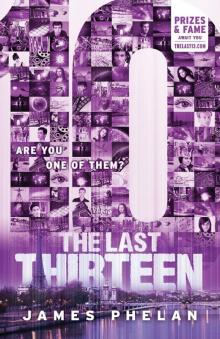 10
10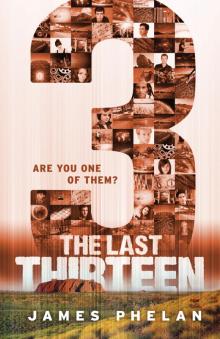 3
3 Survivor
Survivor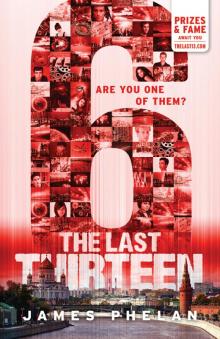 6
6 The Hunted
The Hunted Quarantine
Quarantine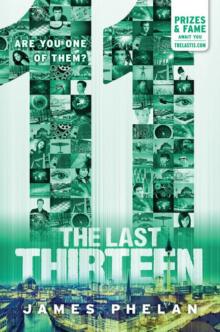 11
11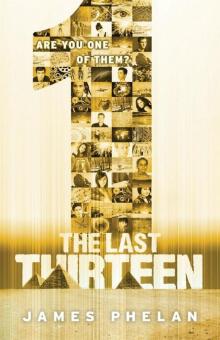 The Last Thirteen - 1
The Last Thirteen - 1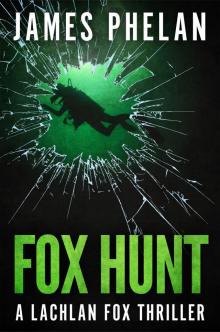 Fox Hunt
Fox Hunt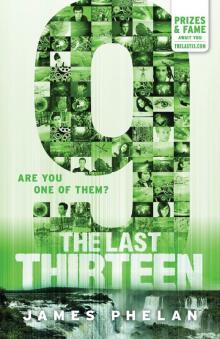 9
9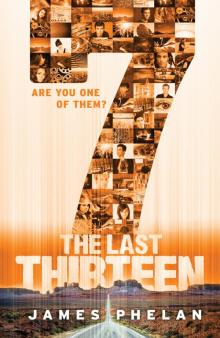 7
7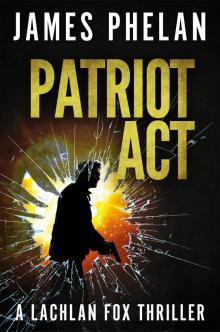 Patriot Act
Patriot Act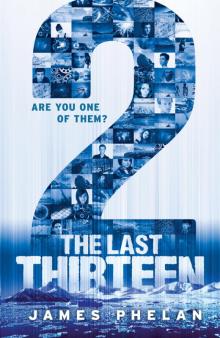 2
2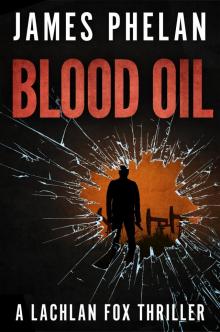 Blood Oil
Blood Oil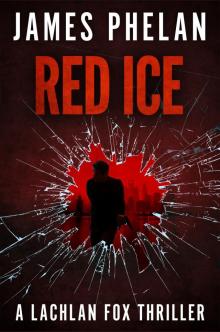 Red Ice
Red Ice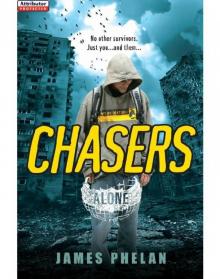 Chasers
Chasers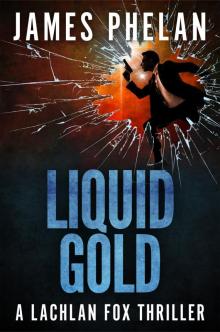 Liquid Gold
Liquid Gold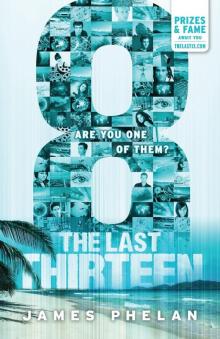 8
8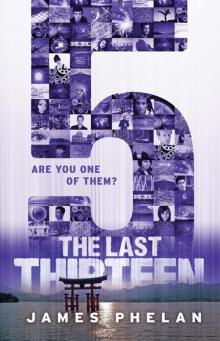 5
5 The Spy
The Spy Kill Switch
Kill Switch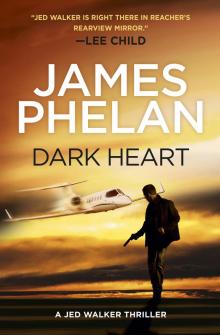 Dark Heart
Dark Heart